人教版(2019)必修第三册Unit 2 Morals And Virtues Discovering useful structures 课件(共27张PPT)
文档属性
| 名称 | 人教版(2019)必修第三册Unit 2 Morals And Virtues Discovering useful structures 课件(共27张PPT) |
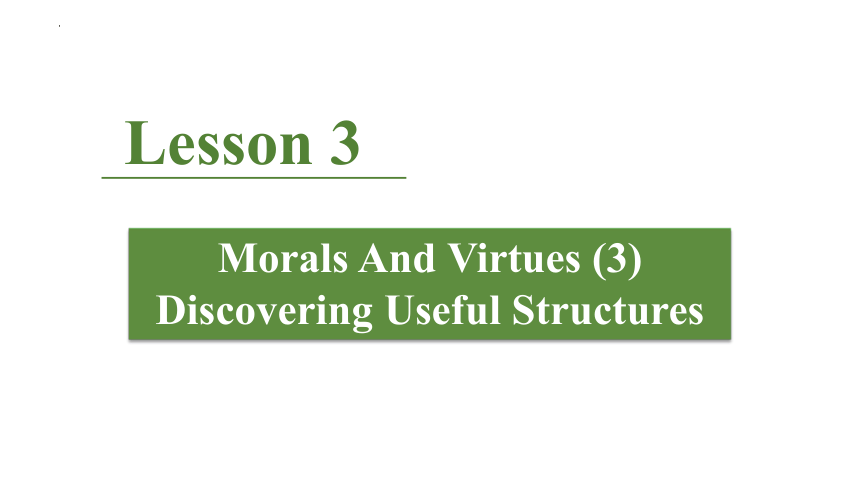
|
|
| 格式 | zip | ||
| 文件大小 | 424.9KB | ||
| 资源类型 | 教案 | ||
| 版本资源 | 人教版(2019) | ||
| 科目 | 英语 | ||
| 更新时间 | 2023-04-22 20:03:43 | ||
图片预览

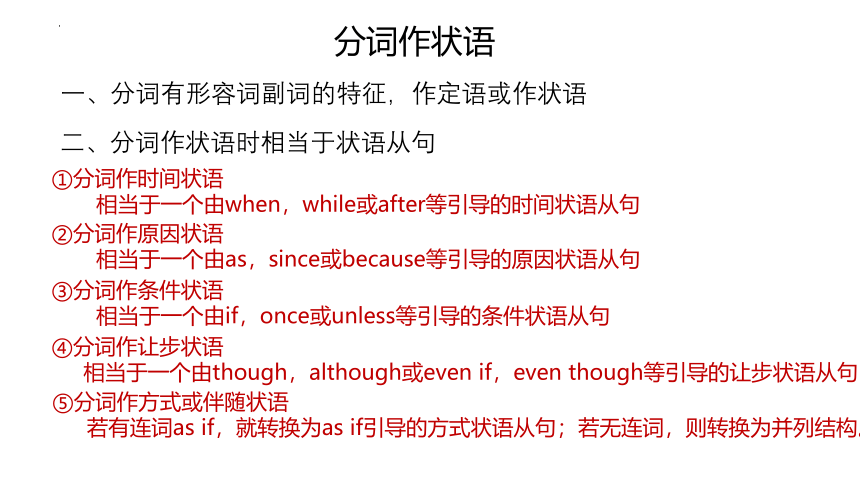
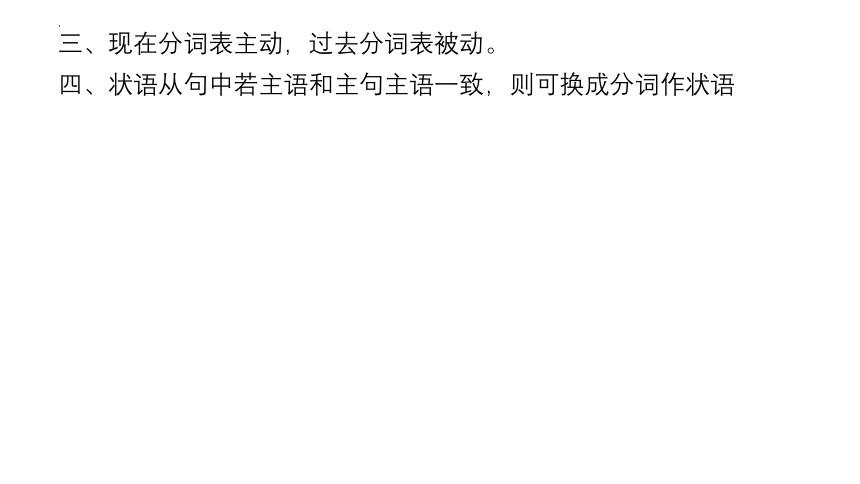
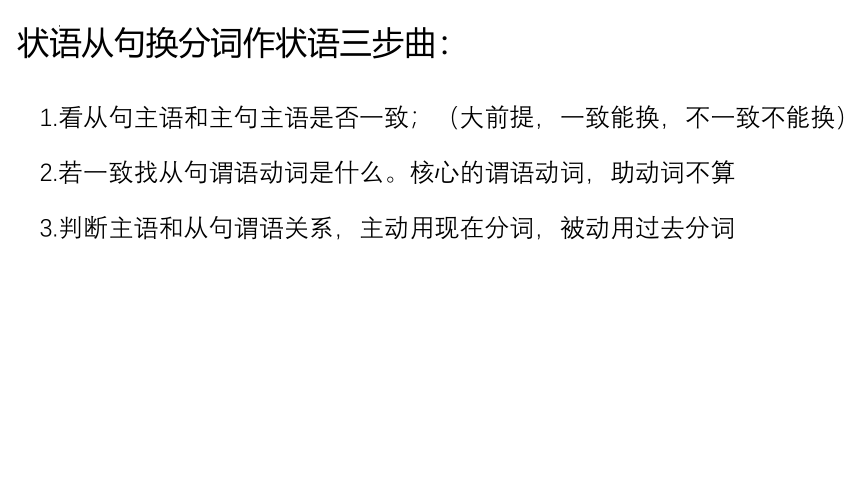
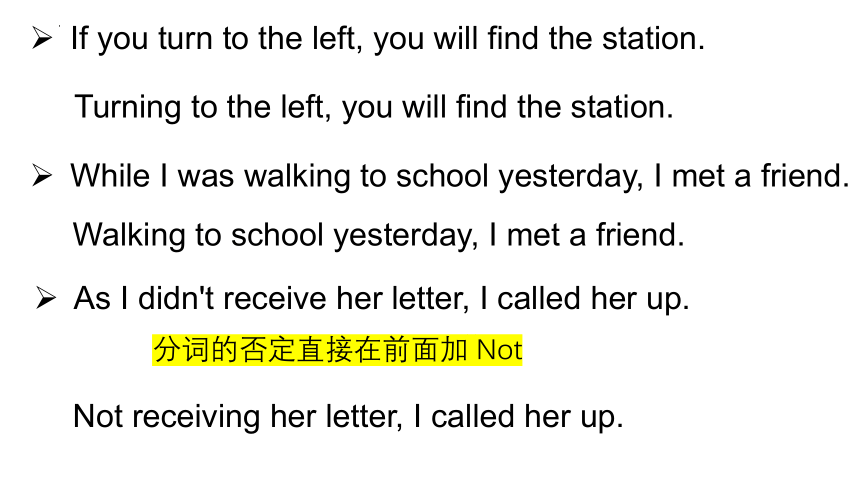
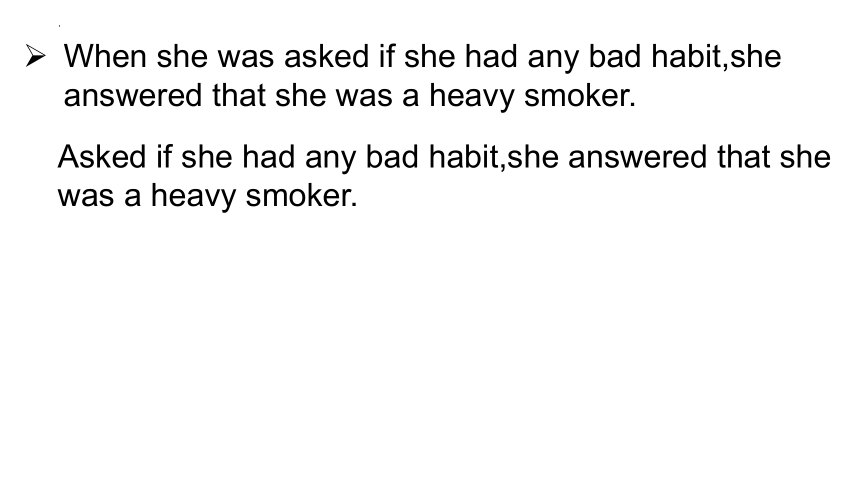
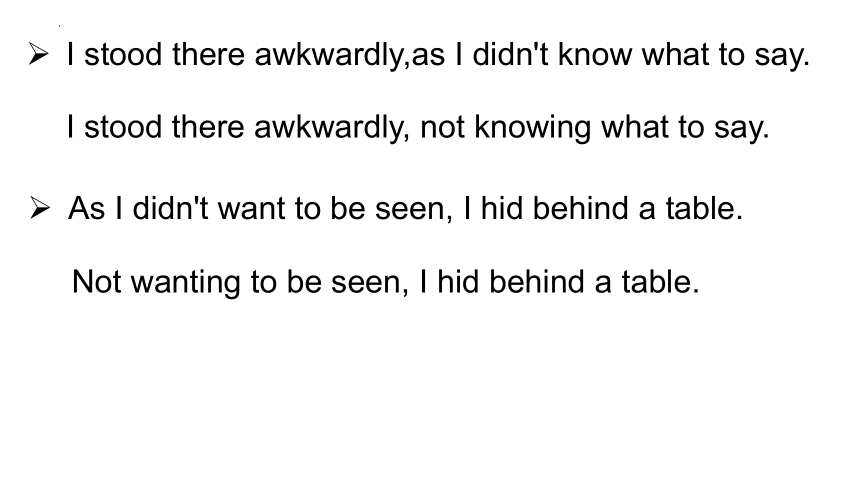
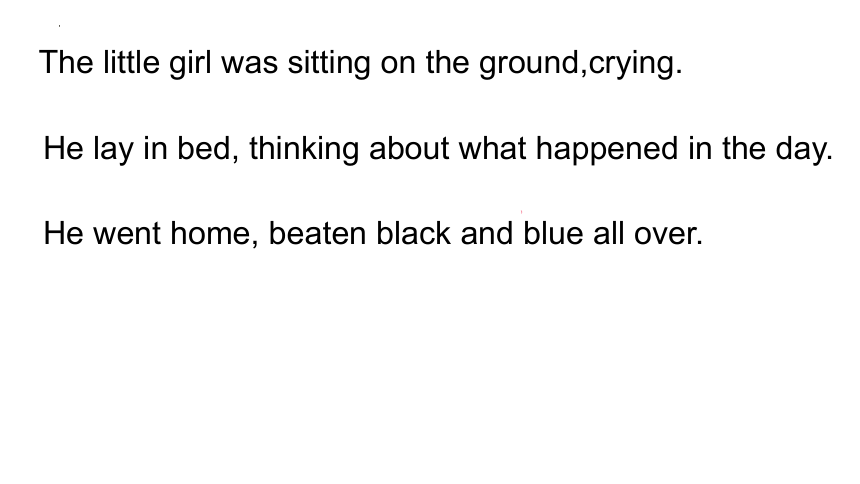
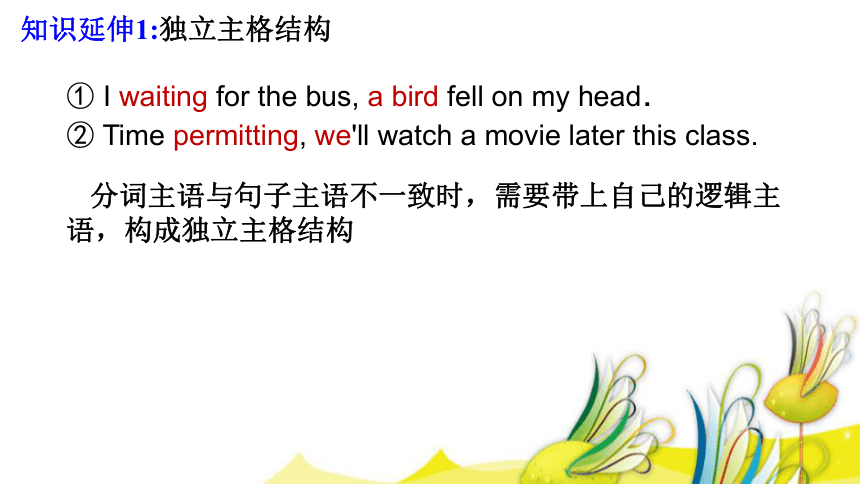
文档简介
(共27张PPT)
Lesson 3
Morals And Virtues (3)
Discovering Useful Structures
分词作状语
一、分词有形容词副词的特征,作定语或作状语
二、分词作状语时相当于状语从句
①分词作时间状语
相当于一个由when,while或after等引导的时间状语从句
②分词作原因状语
相当于一个由as,since或because等引导的原因状语从句
③分词作条件状语
相当于一个由if,once或unless等引导的条件状语从句
④分词作让步状语
相当于一个由though,although或even if,even though等引导的让步状语从句
⑤分词作方式或伴随状语
若有连词as if,就转换为as if引导的方式状语从句;若无连词,则转换为并列结构。
三、现在分词表主动,过去分词表被动。
四、状语从句中若主语和主句主语一致,则可换成分词作状语
状语从句换分词作状语三步曲:
1.看从句主语和主句主语是否一致;(大前提,一致能换,不一致不能换)
2.若一致找从句谓语动词是什么。核心的谓语动词,助动词不算
3.判断主语和从句谓语关系,主动用现在分词,被动用过去分词
If you turn to the left, you will find the station.
Turning to the left, you will find the station.
While I was walking to school yesterday, I met a friend.
Walking to school yesterday, I met a friend.
As I didn't receive her letter, I called her up.
分词的否定直接在前面加 Not
Not receiving her letter, I called her up.
When she was asked if she had any bad habit,she answered that she was a heavy smoker.
Asked if she had any bad habit,she answered that she was a heavy smoker.
I stood there awkwardly,as I didn't know what to say.
I stood there awkwardly, not knowing what to say.
As I didn't want to be seen, I hid behind a table.
Not wanting to be seen, I hid behind a table.
The little girl was sitting on the ground,crying.
He lay in bed, thinking about what happened in the day.
He went home, beaten black and blue all over.
知识延伸1:独立主格结构
① I waiting for the bus, a bird fell on my head.
② Time permitting, we'll watch a movie later this class.
分词主语与句子主语不一致时,需要带上自己的逻辑主语,构成独立主格结构
知识延伸1:独立主格结构
① I waiting for the bus, a bird fell on my head.
② Time permitting, we'll watch a movie later this class.
分词主语与句子主语不一致时,需要带上自己的逻辑主语,构成独立主格结构
在英语中,谓语只能是动词,不是谓语的动词全部改成非谓语动词。独立主格结构在句中作状语,多用于书面语。 独立主格结构本身不是句子,在句子中作状语,表时间、原因、条件、伴随、目的及状态等。
知识延伸2: ( doing 和having done 作状语的区别)
① Thinking of all the people still in need of help , Dr
Lin opened a private a clinic.
②Though Lin Qiaozhi never married, she was known
as the “mother of ten thousand babies”, having
delivered over 50,000 babies in her lifetime.
doing 作状语,表示的动作与句子谓语动词同时发生;having done表示的动作发生在句子谓语动词之前
主动形式(否) 被动形式(否)
一般式
完成式
(not) doing
2.Ving 各种形式:(下列动词以do为例)
(not) having done
(not) being done
(not) having been done
知识延伸3: (doing 和 to do 作结果状语的区别)
① The COVID-19 broke out throughout the world,
causing hundreds of thousands of deaths.
②I came to school last Sunday morning ,only to find
nobody was in our classroom.
doing 作结果状语时,常表示自然而然,情理之中的结果;to do 作结果状语时往往表示出乎意料的结果,通常与only 连用。
Describe people’s actions
Read the sentences below and discuss the function and meaning of each -ing form. Then find more examples from the unit.
1 ...Her brother complained, thinking of the high tuition fees.
adverbial (状语)
Her brother complained when he thought of the high tuition fees.
Describe people’s actions
Read the sentences below and discuss the function and meaning of each -ing form. Then find more examples from the unit.
2 Thinking of all the people still in need of help, Dr Lin opened a private clinic.
adverbial (状语)
When Dr Lin thought of all the people still in need of help, she opened a private clinic.
Describe people’s actions
Read the sentences below and discuss the function and meaning of each -ing form. Then find more examples from the unit.
3 The new People’s Republic of China saw Dr Lin Qiaozhi playing a key role.
object complement (宾语补足语)
它所描述的行为和状态与句子的宾语密切相关,大多用在某些动词(see, hear, watch, notice, find, keep, catch, leave …)后面表示正在进行的动作。
2.哪些词或结构后可用V-ing /V-ed作宾语补足语?
表示______________的动词, 常见的有see, hear, find, notice, observe, listen to等,后作宾补。
感觉和心理状态
观察归纳1:
表示_________, 常见的有 have, set, keep, get, catch, leave等,可作宾补。
观察归纳2:
使役动词
观察归纳3:
用于_______________ 的复合结构中,对宾语起补充说明作用。
with+宾语+宾补
Describe people’s actions
Complete the sentences with the correct forms of the verbs.
1. __________ that his wife had been injured in an accident, Mr Johnson hurried to the hospital.
2. During the operation, she sat in the waiting room for over an hour __________ about him.
3. I saw her whispering something into his ear, obviously not __________ to be heard.
4. He suddenly woke up at midnight when he heard someone __________ at his door.
feel want face smile return worry hear knock
Hearing
worrying
wanting
knocking
As soon as he heard that... 时间状语
She was worrying/worried...伴随状语
because she didn't want ...原因状语
Describe people’s actions
Complete the sentences with the correct forms of the verbs.
5. __________ higher import and export costs, the company is looking for ways to survive.
6. __________ from the North Pole, the traveller wrote a book about his experience and had it published the following year.
7. The child lay on her mother’s lap, __________ sweetly.
8. __________ hurt by the rejection, she bit her lip and quietly walked away.
feel want face smile return worry hear knock
Facing
Returning
smiling
Feeling
Since it is facing... 原因状语
When she returned from...时间状语
She was smiling/smiled...伴随状语
Because she felt hurt...原因状语
Complete the sentences with the correct forms of the verbs.
Henry Norman Bethune was a Canadian doctor with a very creative mind and a determination to help people. As a small boy, he became very interested in medicine and decided to become a doctor. After he graduated from medical college in 1916, Bethune worked as a doctor in England, the US, and Canada. He reinvented or redesigned over 10 medical instruments to make them more useful. In 1938, Bethune left for China, after he heard that many people were dying in the war. Despite the difficult situation, Dr Bethune did whatever he could to assist the Chinese people. He helped to organise hospitals, taught doctors and nurses, and showed people how to give first aid. Sadly, Dr Bethune passed away in November the following year and was buried in Shijiazhuang. After Dr Bethune’s death, Chairman Mao Zedong wrote an article in memory of him, in which he praised Dr Bethune as a hero to be remembered in China.
Complete the sentences with the correct forms of the verbs.
As a small boy, he became very interested in medicine and decided to become a doctor.
2. In 1938, Bethune left for China, after he heard that many people were dying in the war.
As a small boy, he became very interested in medicine, deciding to become a doctor.
In 1938, Bethune left for China, after hearing that many people were dying in the war.
Complete the sentences with the correct forms of the verbs.
3. He helped to organise hospitals, taught doctors and nurses, and showed people how to give first aid.
4. Chairman Mao Zedong wrote an article in memory of him, in which he praised Dr Bethune as a hero to be remembered in China.
He helped to organise hospitals, teaching doctors and nurses, and showing people how to give first aid.
Chairman Mao Zedong wrote an article in memory of him, praising Dr Bethune as a hero to be remembered in China.
Describe people’s actions
Rewrite the following sentences using the –ing form or the past participle as the adverbial. (P69/Ex2)
1. Because I did not know anyone, I sat alone in my seat for two hours.
2. Although Joe was upset by the reporter’s words, he responded to his questions politely.
Not knowing anyone, I sat alone in my seat for two hours.
Although upset by the reporter’s words, Joe responded to his questions politely.
Example
Describe people’s actions
Rewrite the following sentences using the –ing form or the past participle as the adverbial. (P69/Ex2)
1. As she was frightened by the noise, Amy turned on all the lights in the house.
2. While they were driving along the freeway, they noticed a kangaroo standing in the middle of the road.
Frightened by the noise, Amy turned on all the lights in the house.
While driving along the freeway, they noticed a kangoroo standing in the middle of the road.
Describe people’s actions
Rewrite the following sentences using the –ing form or the past participle as the adverbial. (P69/Ex2)
3. After we watched the movie for ten minutes, we felt so bored that we decided to leave.
4. As I came out of my house, I saw the volcano erupting(爆发).
5. After she turned fifteen, she became interested in travelling.
After watching the movie for ten minutes, we felt so bored that we decided to leave.
Coming out of my house, I saw the volcano erupting.
After turning fifteen, she became interested in travelling.
Describe people’s actions
Rewrite the following sentences using the –ing form or the past participle as the adverbial. (P69/Ex2)
6. Because she didn’t want to be late, Sally ran to the subway station.
7. Tim was feeling tired, so he went to bed as soon as he got home.
8. After he gathered all his courage, he ran back into the burning house to rescue the child.
Not wanting to be late, Sally ran to the subway station.
Feeling tired, Tim went to bed as soon as he got home.
Gathering all his courage, he ran back into the burning house to rescue the child.
Homework
Review the usage of the –ing form.
Finish exercise book.
Lesson 3
Morals And Virtues (3)
Discovering Useful Structures
分词作状语
一、分词有形容词副词的特征,作定语或作状语
二、分词作状语时相当于状语从句
①分词作时间状语
相当于一个由when,while或after等引导的时间状语从句
②分词作原因状语
相当于一个由as,since或because等引导的原因状语从句
③分词作条件状语
相当于一个由if,once或unless等引导的条件状语从句
④分词作让步状语
相当于一个由though,although或even if,even though等引导的让步状语从句
⑤分词作方式或伴随状语
若有连词as if,就转换为as if引导的方式状语从句;若无连词,则转换为并列结构。
三、现在分词表主动,过去分词表被动。
四、状语从句中若主语和主句主语一致,则可换成分词作状语
状语从句换分词作状语三步曲:
1.看从句主语和主句主语是否一致;(大前提,一致能换,不一致不能换)
2.若一致找从句谓语动词是什么。核心的谓语动词,助动词不算
3.判断主语和从句谓语关系,主动用现在分词,被动用过去分词
If you turn to the left, you will find the station.
Turning to the left, you will find the station.
While I was walking to school yesterday, I met a friend.
Walking to school yesterday, I met a friend.
As I didn't receive her letter, I called her up.
分词的否定直接在前面加 Not
Not receiving her letter, I called her up.
When she was asked if she had any bad habit,she answered that she was a heavy smoker.
Asked if she had any bad habit,she answered that she was a heavy smoker.
I stood there awkwardly,as I didn't know what to say.
I stood there awkwardly, not knowing what to say.
As I didn't want to be seen, I hid behind a table.
Not wanting to be seen, I hid behind a table.
The little girl was sitting on the ground,crying.
He lay in bed, thinking about what happened in the day.
He went home, beaten black and blue all over.
知识延伸1:独立主格结构
① I waiting for the bus, a bird fell on my head.
② Time permitting, we'll watch a movie later this class.
分词主语与句子主语不一致时,需要带上自己的逻辑主语,构成独立主格结构
知识延伸1:独立主格结构
① I waiting for the bus, a bird fell on my head.
② Time permitting, we'll watch a movie later this class.
分词主语与句子主语不一致时,需要带上自己的逻辑主语,构成独立主格结构
在英语中,谓语只能是动词,不是谓语的动词全部改成非谓语动词。独立主格结构在句中作状语,多用于书面语。 独立主格结构本身不是句子,在句子中作状语,表时间、原因、条件、伴随、目的及状态等。
知识延伸2: ( doing 和having done 作状语的区别)
① Thinking of all the people still in need of help , Dr
Lin opened a private a clinic.
②Though Lin Qiaozhi never married, she was known
as the “mother of ten thousand babies”, having
delivered over 50,000 babies in her lifetime.
doing 作状语,表示的动作与句子谓语动词同时发生;having done表示的动作发生在句子谓语动词之前
主动形式(否) 被动形式(否)
一般式
完成式
(not) doing
2.Ving 各种形式:(下列动词以do为例)
(not) having done
(not) being done
(not) having been done
知识延伸3: (doing 和 to do 作结果状语的区别)
① The COVID-19 broke out throughout the world,
causing hundreds of thousands of deaths.
②I came to school last Sunday morning ,only to find
nobody was in our classroom.
doing 作结果状语时,常表示自然而然,情理之中的结果;to do 作结果状语时往往表示出乎意料的结果,通常与only 连用。
Describe people’s actions
Read the sentences below and discuss the function and meaning of each -ing form. Then find more examples from the unit.
1 ...Her brother complained, thinking of the high tuition fees.
adverbial (状语)
Her brother complained when he thought of the high tuition fees.
Describe people’s actions
Read the sentences below and discuss the function and meaning of each -ing form. Then find more examples from the unit.
2 Thinking of all the people still in need of help, Dr Lin opened a private clinic.
adverbial (状语)
When Dr Lin thought of all the people still in need of help, she opened a private clinic.
Describe people’s actions
Read the sentences below and discuss the function and meaning of each -ing form. Then find more examples from the unit.
3 The new People’s Republic of China saw Dr Lin Qiaozhi playing a key role.
object complement (宾语补足语)
它所描述的行为和状态与句子的宾语密切相关,大多用在某些动词(see, hear, watch, notice, find, keep, catch, leave …)后面表示正在进行的动作。
2.哪些词或结构后可用V-ing /V-ed作宾语补足语?
表示______________的动词, 常见的有see, hear, find, notice, observe, listen to等,后作宾补。
感觉和心理状态
观察归纳1:
表示_________, 常见的有 have, set, keep, get, catch, leave等,可作宾补。
观察归纳2:
使役动词
观察归纳3:
用于_______________ 的复合结构中,对宾语起补充说明作用。
with+宾语+宾补
Describe people’s actions
Complete the sentences with the correct forms of the verbs.
1. __________ that his wife had been injured in an accident, Mr Johnson hurried to the hospital.
2. During the operation, she sat in the waiting room for over an hour __________ about him.
3. I saw her whispering something into his ear, obviously not __________ to be heard.
4. He suddenly woke up at midnight when he heard someone __________ at his door.
feel want face smile return worry hear knock
Hearing
worrying
wanting
knocking
As soon as he heard that... 时间状语
She was worrying/worried...伴随状语
because she didn't want ...原因状语
Describe people’s actions
Complete the sentences with the correct forms of the verbs.
5. __________ higher import and export costs, the company is looking for ways to survive.
6. __________ from the North Pole, the traveller wrote a book about his experience and had it published the following year.
7. The child lay on her mother’s lap, __________ sweetly.
8. __________ hurt by the rejection, she bit her lip and quietly walked away.
feel want face smile return worry hear knock
Facing
Returning
smiling
Feeling
Since it is facing... 原因状语
When she returned from...时间状语
She was smiling/smiled...伴随状语
Because she felt hurt...原因状语
Complete the sentences with the correct forms of the verbs.
Henry Norman Bethune was a Canadian doctor with a very creative mind and a determination to help people. As a small boy, he became very interested in medicine and decided to become a doctor. After he graduated from medical college in 1916, Bethune worked as a doctor in England, the US, and Canada. He reinvented or redesigned over 10 medical instruments to make them more useful. In 1938, Bethune left for China, after he heard that many people were dying in the war. Despite the difficult situation, Dr Bethune did whatever he could to assist the Chinese people. He helped to organise hospitals, taught doctors and nurses, and showed people how to give first aid. Sadly, Dr Bethune passed away in November the following year and was buried in Shijiazhuang. After Dr Bethune’s death, Chairman Mao Zedong wrote an article in memory of him, in which he praised Dr Bethune as a hero to be remembered in China.
Complete the sentences with the correct forms of the verbs.
As a small boy, he became very interested in medicine and decided to become a doctor.
2. In 1938, Bethune left for China, after he heard that many people were dying in the war.
As a small boy, he became very interested in medicine, deciding to become a doctor.
In 1938, Bethune left for China, after hearing that many people were dying in the war.
Complete the sentences with the correct forms of the verbs.
3. He helped to organise hospitals, taught doctors and nurses, and showed people how to give first aid.
4. Chairman Mao Zedong wrote an article in memory of him, in which he praised Dr Bethune as a hero to be remembered in China.
He helped to organise hospitals, teaching doctors and nurses, and showing people how to give first aid.
Chairman Mao Zedong wrote an article in memory of him, praising Dr Bethune as a hero to be remembered in China.
Describe people’s actions
Rewrite the following sentences using the –ing form or the past participle as the adverbial. (P69/Ex2)
1. Because I did not know anyone, I sat alone in my seat for two hours.
2. Although Joe was upset by the reporter’s words, he responded to his questions politely.
Not knowing anyone, I sat alone in my seat for two hours.
Although upset by the reporter’s words, Joe responded to his questions politely.
Example
Describe people’s actions
Rewrite the following sentences using the –ing form or the past participle as the adverbial. (P69/Ex2)
1. As she was frightened by the noise, Amy turned on all the lights in the house.
2. While they were driving along the freeway, they noticed a kangaroo standing in the middle of the road.
Frightened by the noise, Amy turned on all the lights in the house.
While driving along the freeway, they noticed a kangoroo standing in the middle of the road.
Describe people’s actions
Rewrite the following sentences using the –ing form or the past participle as the adverbial. (P69/Ex2)
3. After we watched the movie for ten minutes, we felt so bored that we decided to leave.
4. As I came out of my house, I saw the volcano erupting(爆发).
5. After she turned fifteen, she became interested in travelling.
After watching the movie for ten minutes, we felt so bored that we decided to leave.
Coming out of my house, I saw the volcano erupting.
After turning fifteen, she became interested in travelling.
Describe people’s actions
Rewrite the following sentences using the –ing form or the past participle as the adverbial. (P69/Ex2)
6. Because she didn’t want to be late, Sally ran to the subway station.
7. Tim was feeling tired, so he went to bed as soon as he got home.
8. After he gathered all his courage, he ran back into the burning house to rescue the child.
Not wanting to be late, Sally ran to the subway station.
Feeling tired, Tim went to bed as soon as he got home.
Gathering all his courage, he ran back into the burning house to rescue the child.
Homework
Review the usage of the –ing form.
Finish exercise book.
